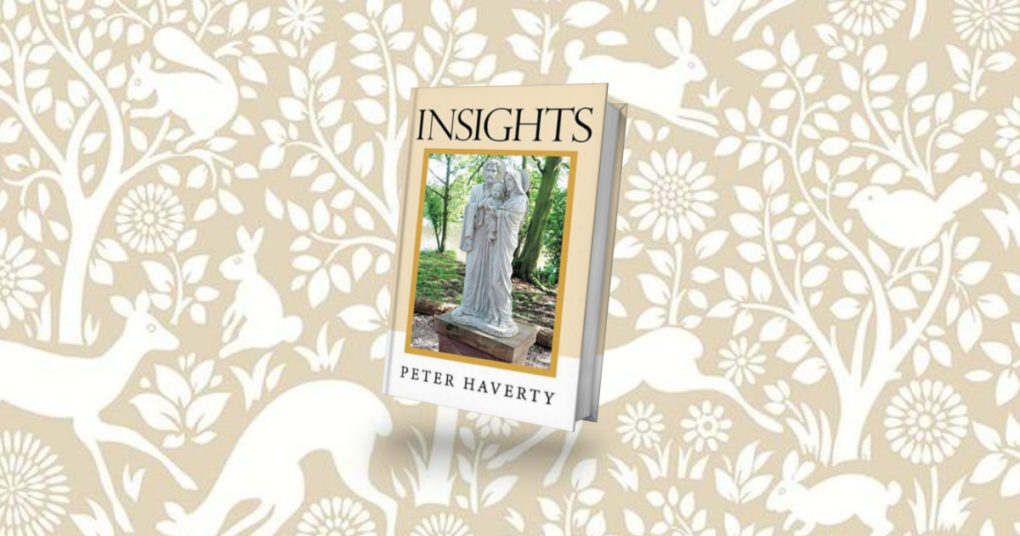Insights
Peter Haverty
AuthorHouse
October 2020
182 pages
Peter Haverty explains how he came up with this book’s rather minimalist title, “Insights”. Sitting in a library, as a young man, he thought to himself: wouldn’t it be wonderful if I had all the knowledge contained in these books in my head? Then, as time moved on, he came to realise “what a lot of copying was going on” and how “each one contributed very few insights of their own”. He addresses many “big issues”: agnosticism, apostasy, the human predicament, redemption, cross and suffering, Christ teaching us how to die, obstinacy in sin, spiritual envy etc. Throughout, we are in the friendly company of the clear-thinking Aristotelian, the calm chemical engineer, the warm priestly heart.
Our author is a disarmingly chatty Yorkshireman, proud of his native town, Kippax, near Leeds, who studied Chemical Engineering at Imperial College, London in the mid 1950s and joined Opus Dei when a resident at Netherhall House. After gaining a doctorate in Philosophy at the Lateran University, Rome, and being ordained to the priesthood in Spain, he spent much of his life after that teaching Philosophy in England. I was one of his students throughout the 1970s and as I read, Insights, I am being reminded constantly of the abundant stories, analogies and examples with which Fr Peter expertly laced his classes. He posed constant questions to us, and the resultant discussions and “craic” were only mighty – as, no doubt, were those with Aristotle!
One afternoon in Rome in 1961, in a relaxed get-together in the garden of Villa Tevere, the headquarters of Opus Dei, he asked St Josemaria, Founder of Opus Dei, to teach him and his companions how to do apostolate with people who do not believe in God. His answer was immediate: “your brothers in England will be able to tell you better than I can” – a sign of his great humility. But over the years, he found that St Josemaria had a very shrewd assessment of how people adduce all sorts of excuses for not believing in God. Some take the scientific route, claiming the universe is able to sustain itself. Others cry out against the existence of a God when a natural disaster occurs. “This is the most ancient of all the theories that dispose of God: the problem of evil. Until St Augustine, I think I am right in saying, dualism was the answer given”: two gods, one to account for evil in the world, the other for good. Augustine, however, solved that problem, by explaining that evil was simply a privation of good.”
Given the renewed outbreak of Marxist ideas today, I will mention an insight he got from St Josemaria, who said that “Marxism is the most ingenious idea yet devised by man to justify apostasy.” It pretends to solve the problem of the rich oppressing the poor, but just enables another set of people to lord it over the rest, motivated usually by greed. At a deeper level, he suggests that the error lies in the idea that the State is God, and that our goodness consists in striving to be good citizens – instead of simply good men and women!
One basic insight, presented early on, which can fill us with hope, is this: all of God’s attributes (Truth, Goodness, Holiness, justice Mercy etc.) are one. Goodness is united, in God, to omnipotence. God’s Unity is key!
To conclude, Insights is a concise, chatty book with constant reference to Scripture, Catholic teaching, stories and lives of the saints, and daily life. It will appeal to almost anyone, believer or not, young or old, especially if they have an open, enquiring mind.
About the Author: Rev. Philip Griffin
Rev. Philip Griffin holds a PhD in Plant Science from Manchester, where he spent ten years teaching. Ordained to the priesthood in 1981, he worked in Opus Dei centres in Enugu, Nigeria, where he was also a university chaplain and lecturer in Plant Science. Until recently he was chaplain of Rosemont School, Dublin.

